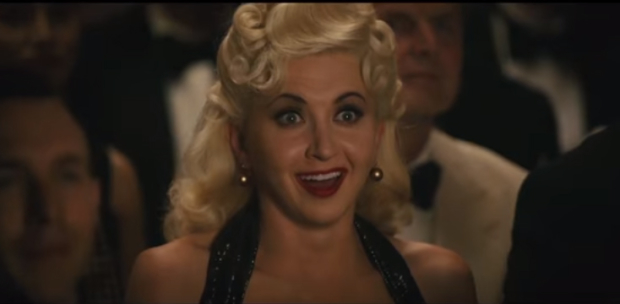Nina Arianda Laughs and Lindy-Hops to the Screen in Florence Foster Jenkins
The Tony-winning actress talks Meryl Streep magic and lessons to be learned from the worst singer in America.
Nina Arianda may not be onstage year-round, but Broadway will never forget her 2012 Tony-winning performance as Vanda in David Ives' Venus in Fur. She starred off-Broadway in Tales From Red Vienna in 2014 and returned to Broadway in 2015 in Sam Shepard's Fool For Love, but has been periodically stolen away for various television and film projects — the latest of which required her to Lindy-Hop with Hugh Grant and fall into hysterics at Meryl Streep's rendition of "Queen of the Night."
Agnes Stark is her brassy character's name in Florence Foster Jenkins, a new film (based on the stage play Souvenir) chronicling the life of the title New York socialite Florence Foster Jenkins whose lack of singing ability was only matched by her passion for the music she performed. While at first one of Madame Florence's hecklers, Agnes eventually becomes one of her cheerleaders — a sentiment that Arianda finds heartening as both a performer and just a human in a world where "trying" has gone out of style.

(© Tristan Fuge)
How did this part in Florence Foster Jenkins come your way?
If I remember correctly, my agents received a letter from Stephen Frears asking me to do the part, which was incredible exciting. That doesn't happen very often, so it's a great honor.
As a character responsible for much of the comic relief, your scenes must have been a lot of fun to shoot. Do you have a favorite?
It's hard to compare one to another but personally I loved the challenge of doing the Lindy Hop. I thought that was wild, and that's something that I've never done before. I've never danced in film so I thought that was really cool. It's just a fun challenge to learn something that's so strenuous.
In one scene, you basically have to just laugh uncontrollably at Meryl Streep's performances until you're removed from the theater. Was that difficult to do?
The concept on paper is a lot scarier than doing it. When you have to do it you just do it and you take what's around you and you use it. In general I think there's kind of an expectation that joy is easily accessible to people and I think that joy is just as extreme an emotion as any other. It comes with the same challenges of having that live in you organically.
Much of what you do in the film is watch Meryl Streep perform full concerts as Florence Foster Jenkins. What did you take away from just sitting and watching her work up close?
I don't know if I want to talk about her process because that's hers and that's private to her experience, but I will say it's incredibly inspiring to watch someone with such confidence disappear into a character. The importance that she placed on Florence superseded anything around her and it's magical to watch.
Have you ever been subject to ridicule onstage, or witnessed someone else being subjected to ridicule?
No. I think that we have a lot of respect — I mean, forget about the cell phone thing — but theater is a religion in New York. I think that you will quickly be told if you disrespect the church. It is part of our city. It's our fabric in New York in a way, so I think it's taken more seriously. I was lucky enough to grow up in that kind of an environment. If anything, I've seen people escorted out. But again, those arguments have been because of maybe a candy wrapper that got out of control. It always came from a place of protecting the performance, not necessarily to provoke the performers. It's an audience protecting the piece.
Florence Foster Jenkins' famous quote is, "People may say I can't sing, but no one can ever say I didn't sing." As a performer, does that sentiment resonate with you?
Not to get too philosophical, but I think there's so much fear in attempt nowadays. Not only that, but there's a fear in going one-hundred-percent with an attempt, and I think it's very brave to put yourself out there. That kind of statement I think exemplifies the performer's experience and in a way what actors have to do on a regular basis, which is put themselves out there. It's a very emotional thing because a lot of people don't really quite get what it means to put yourself out there because they're too scared to. In a way, I hope that this movie and the message behind it and what Meryl does with the performance inspires people to try — you know?










